Most parents are faced with the choice of quality and healthy products for feeding their baby. The choice of the manufacturer plays an important role in resolving this issue. A review of the best of them for 2020, compiled by the editors of the site "bestx.htgetrid.com/en/", will tell you how to choose the right food for your baby, which products (domestic or foreign) are better, and what should be paid for in the characteristics of the product Attention.
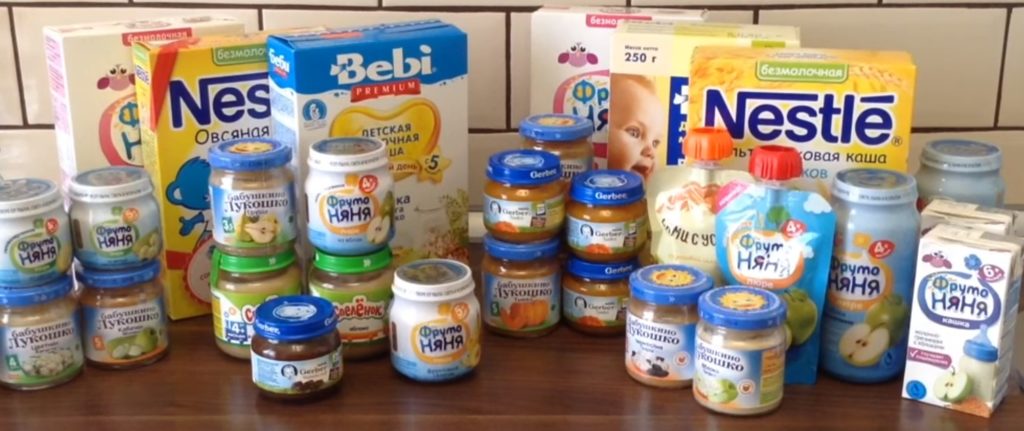
Content
Types of baby food
Baby food - specialized products for children, manufactured in compliance with state standards and requirements, intended for feeding children, taking into account their age physiological characteristics. For the correct development of the baby's body, providing it with the necessary amount and composition of nutrients, as well as maintaining the beneficial intestinal microflora, it is important to make the right choice, both the manufacturer and the type of baby food.
To understand which children's product is better to buy, as well as what main function the manufacturer produced it with, one should understand its types.
Food for children is produced in:
- Mixtures;
- Puree;
- Kashah;
- Juices and other drinks;
- Puddings;
- Fermented milk products.
The first type and some drinks can be used to feed newborns. The remaining types are introduced into the diet gradually, focusing on the age of the baby and the characteristics of his body.
Let's dwell in a little more detail on each type.
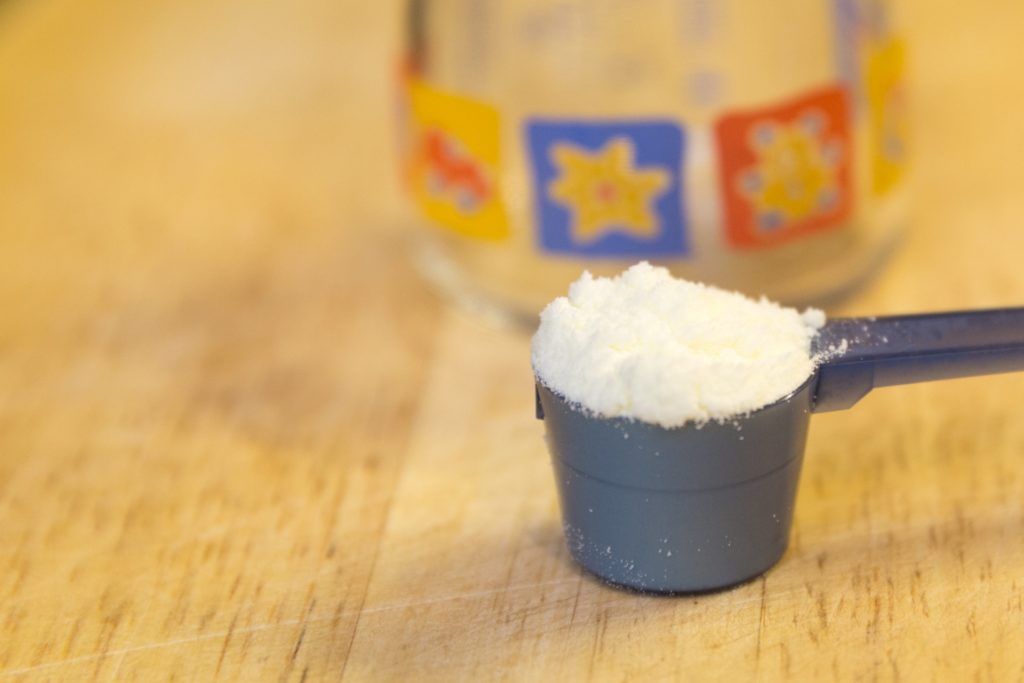
Food fusion for kids
This type of diet is especially important when breastfeeding is absent or insufficient. The mixtures, being its substitute, are close in composition to breast milk. Their content necessarily includes vitamins, minerals, probiotics and other necessary components. In turn, the mixtures differ in some characteristics.
Depending on the composition, there are:
- Dairy. The base is specially processed cow or goat milk. Depending on the proximity of the composition to breast milk, adapted (as close as possible in their properties), partially adapted and non-adapted (based on dry whole cow's milk and containing starch) mixtures are distinguished. The disadvantages of this subspecies are possible allergic reactions due to poor absorption of animal proteins.
- Dairy-free. A special type of formula designed for children who are intolerant or sensitive to cow's milk protein. Features of the composition: the absence of whey and the presence of soy protein.
- Gluten Free. Like the previous type, these are special mixtures. Designed for children who have plant protein intolerance.
- Fermented milk. The composition includes curdled protein, which is easily absorbed by the baby's digestive system in the first months of life, forming a useful microflora.
- Finylalanine free. The product is made on the basis of soybeans and is intended for feeding babies with phenylketonuria.
Hypoallergenic. As the name suggests, the indication for this type of formula is an allergy to the protein components of the diet.
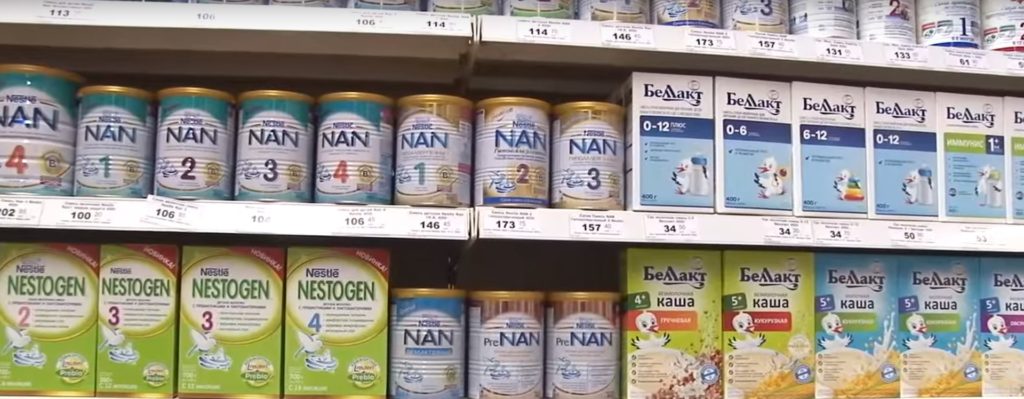
By consistency, they are distinguished: dry (produced in the form of a powder that requires dilution with boiled water) and liquid (ready-to-use) mixtures. It should be borne in mind that the latter are perishable products and after opening the package they can be stored for no more than 2 days. There is also a division by age of the little consumer. Information about from what and at what age the mixture is applied is placed on the package.
Depending on the composition, various mixtures can be eaten from birth to 3 years. Products that can be used in the first six months of a baby's life are called start products. Some manufacturers use special designations to determine the age category:
- For the smallest (first 6 months) - "1";
- From half a year to 1 year - "2";
- From 1 year - "3";
- For premature, weakened babies, as well as underweight children, the designation "0" is used.
It is important to follow the labeling on the packaging as the composition of baby food changes. In addition, formulas from 6 months old cannot be used for feeding babies.
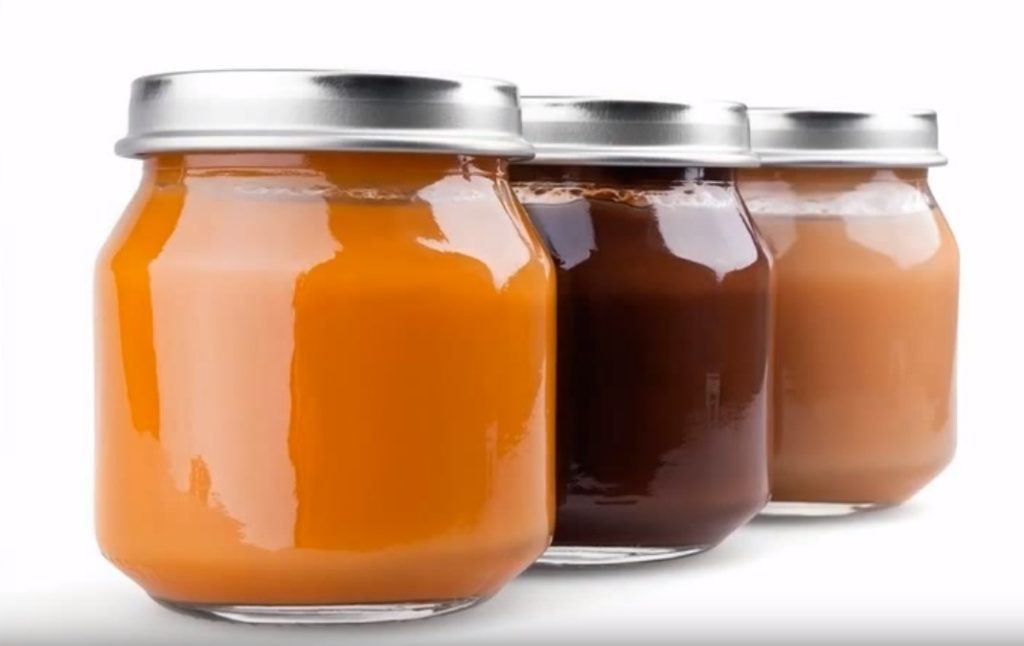
Baby puree
This species is represented by canned foods. On sale there is both natural puree (without other components) and supplemented with sugar, natural flavors and citric acid.
Puree is introduced into the diet of a child over 4 months old. This should be done carefully, with a small dose. It is desirable that the composition of the product includes only 1 main ingredient (for example, applesauce). This reduces the risk of a possible allergic reaction.
Purees are homogenized (the most finely ground), finely ground and coarsely ground.
Canned vegetables, meat and fish are usually also classified as puree baby food. In terms of composition, they are: one-component and mixed.
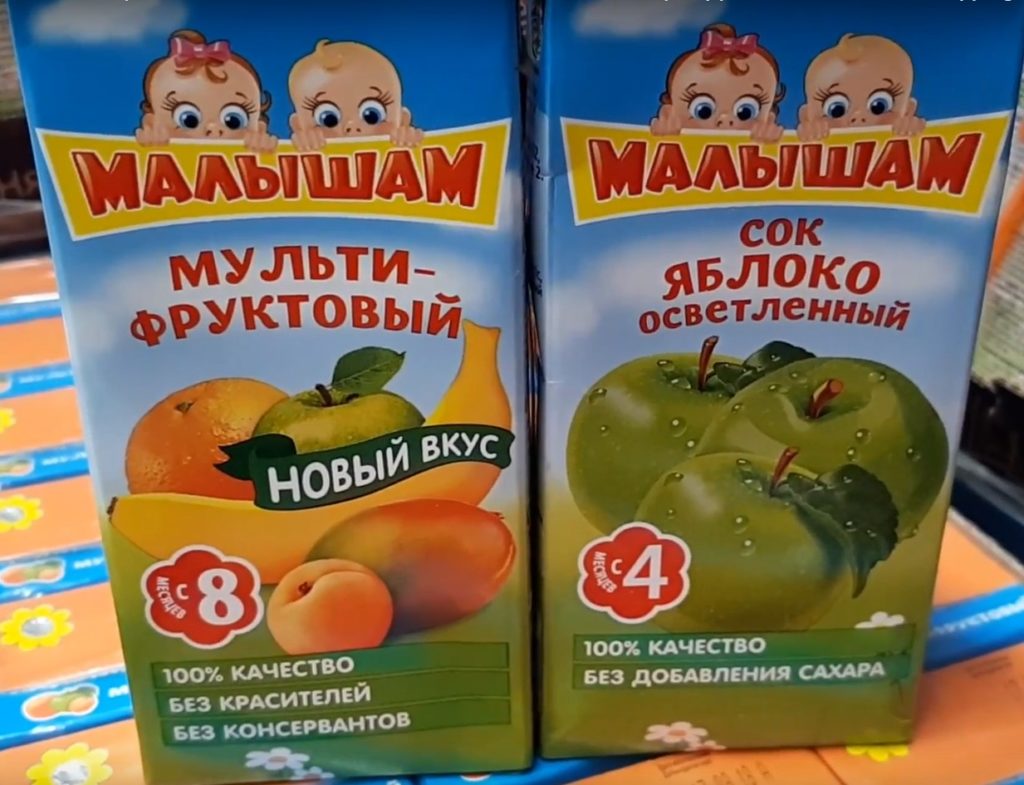
Juices and other drinks
Like puree, baby juices are canned products and are introduced into the diet no earlier than the child reaches 3 - 4 months. There are:
- One-piece and mixed;
- With and without pulp;
- Natural and with additives.
Other drinks include:
- Nectars;
- Fruit drinks and compotes;
- Dairy drinks;
- Tea.
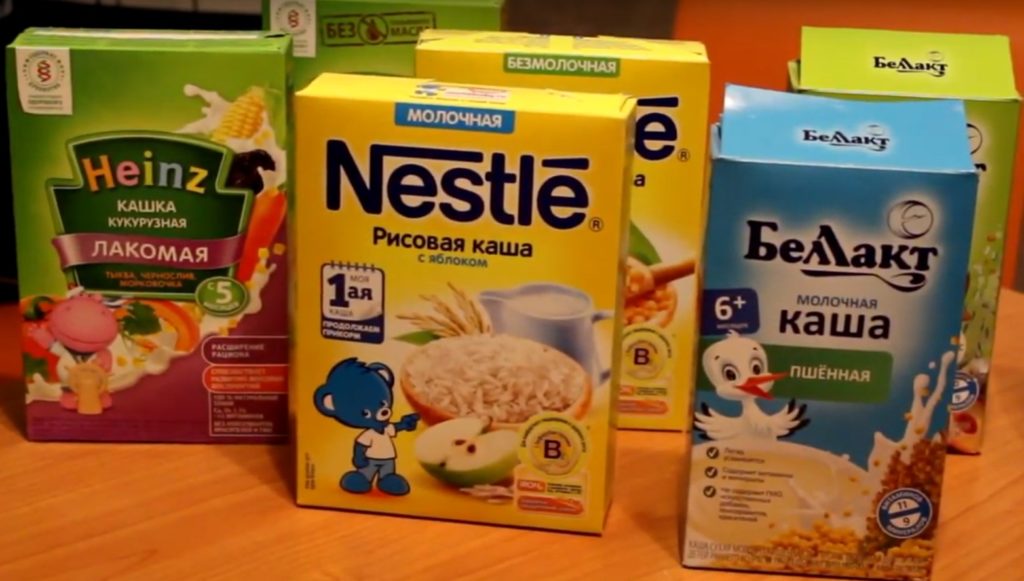
Porridge
They are flour of various cereals. Like mixtures, cereals have their own subspecies, determined according to various criteria:
- The composition of the cereals used: mixed and made using 1 cereal;
- Cooking method: requiring and not requiring cooking;
- Basis: dairy and dairy-free.
Of course, a quality product is enriched with a vitamin and mineral supplement, and the composition contains useful nutritional components, such as probiotics and prebiotics, fruit or vegetable flour, and dietary fiber.
Porridge is purchased for feeding children over 5 months old.
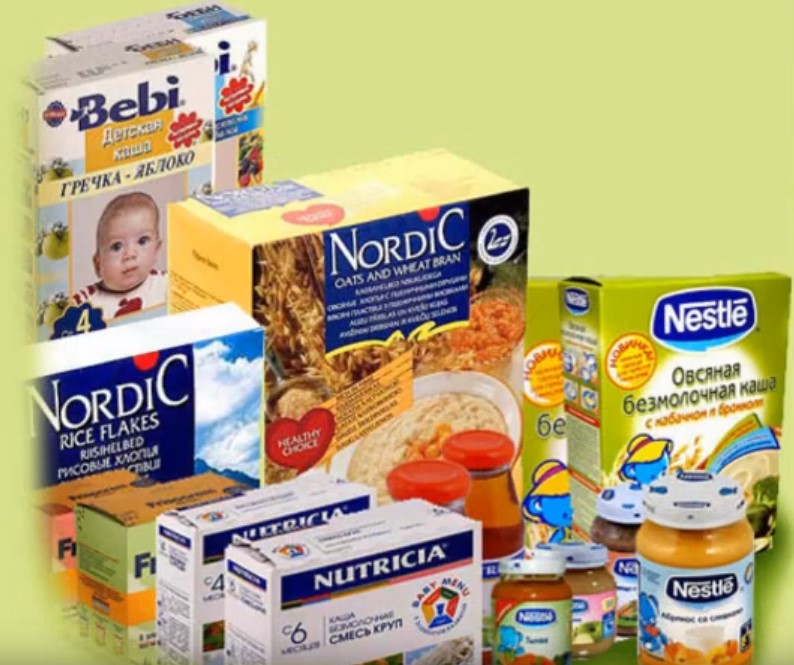
Advantages and disadvantages of using baby food
When asked whether to use industrially manufactured products in feeding, each parent must answer independently, based on the personal situation and physiology of the baby. There are advantages and disadvantages to using these products.
Advantages:
- Balance;
- Availability for sale;
- Range;
- Choice of food type;
- The ability to diversify the diet;
- Simplicity and speed of preparation;
- Possibility of purchasing special types of rations.
Disadvantages:
- Lack of components of breast milk;
- Cost;
- Irrational (destruction of unused residues).
Criterias of choice
When deciding on the use of baby food in a child's diet, you should pay attention to the following parameters.
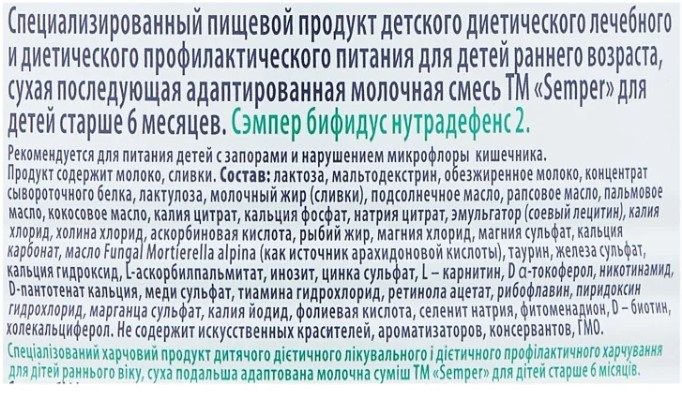
The composition of the product
When purchasing a product, you should take into account what category of children it is intended for. By its properties, it can be used for:
- Healthy children;
- Children with certain medical conditions requiring a special diet;
- Premature babies;
- Underweight children.
Be sure to pay attention to the presence of:
- Synthetic or artificial substances;
- Palm or rapeseed oil.
These products are not worth buying.
Availability of product descriptions and instructions
This is one of the indicators that mark the quality of the manufacturer's work. It should also be remembered that using baby food on your own can lead to negative consequences in the well-being of the child. You should always read the product description and apply it in accordance with the instructions.

Quality documentary evidence
Baby food is a specialized product that undergoes a thorough quality control and is subject to mandatory certification. The result of this procedure is state registration with the issuance of an appropriate certificate and declaration of goods.
Manufacturer
As customer reviews show, the companies that have been specializing in the production of baby food for many years are the most trusted. As a rule, the products of such companies are made of high quality materials and are in demand.
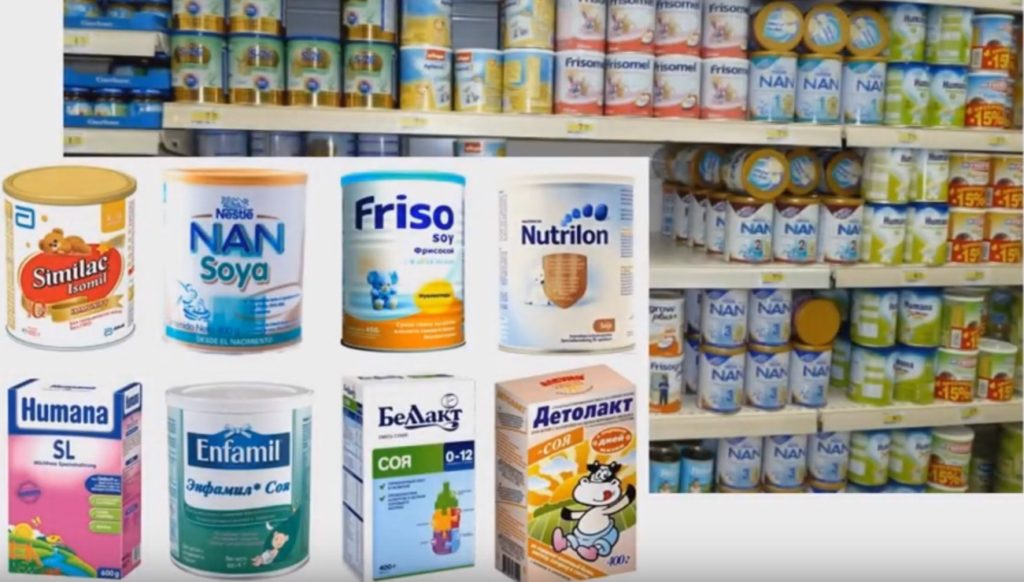
The best baby food manufacturers of 2020
The rating of quality manufacturers, compiled in the opinion of buyers, is presented by both foreign and Russian companies.
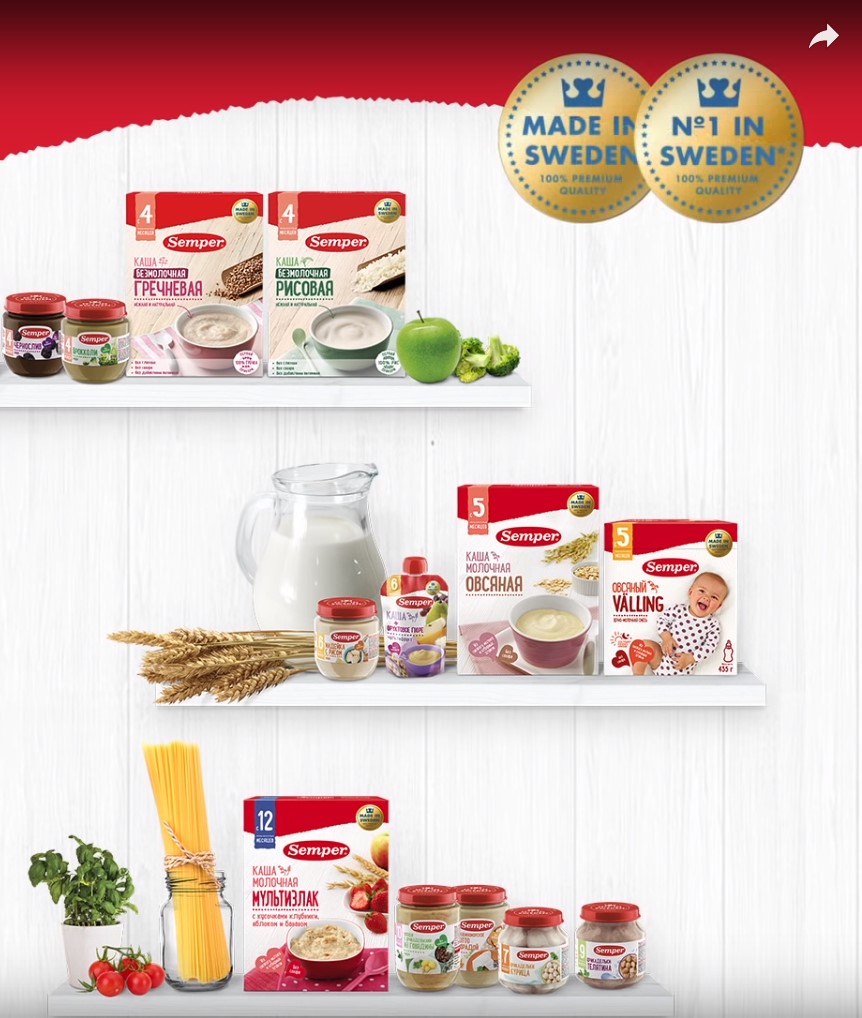
Semper
The Swedish company has been present on the premium baby food market for over half a century. The company has been operating on the Russian market since 1997. The company has a strict production control system, which allows customers to be confident in the quality of the purchased goods.
We manufacture products for children from birth to 3 years old. The Semper assortment also includes wellings. Welling is a traditional Swedish cereal milk drink that can be eaten by children from 8 months of age. It is also worth noting meatballs, which are produced both mono-composition (containing only meat) and mixed (for example, with rice or vegetables). There are fish based options and Italian pasta. Fruit and fruit and berry (for example, apple and strawberry) puree is convenient to purchase in soft packaging, which you can take for a walk or trip.
Average product price (in rubles):
- Mixtures - 700;
- Fruit and vegetable purees - 75;
- Multicomponent puree - 120;
- Porridge - 300;
- Meatballs - 170;
- Juices - 70.
Advantages:
- No artificial additives, colors or GMOs;
- Diverse composition;
- Good assortment.
Disadvantages:
- The composition contains rapeseed oil;
- Cost.
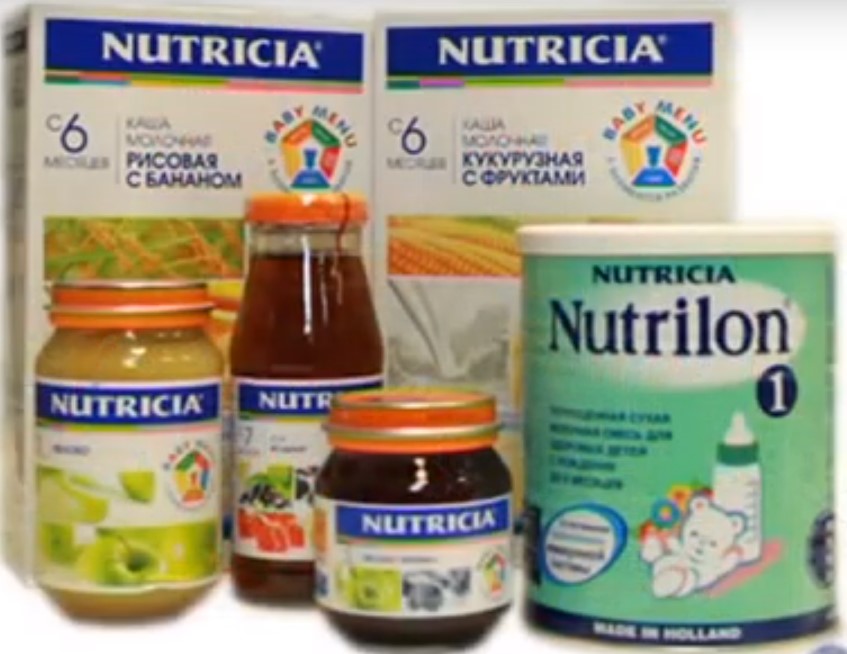
Nutricia
The company is based in the Netherlands and is a division of Danone. Nutricia is recognized in the specialty nutrition market and is the expert opinion of the baby food industry from the very first days of life. The product lines are designed for babies of all ages. There are specialized options, taking into account the physiology and problems of the baby. The basic diet is presented in 3 categories:
- Nutrilon. These are milk formulas that can be consumed from birth to 3 years old.
- Baby. It is represented by mixtures that do not contain sugar, as well as cereals.
- Kid. Milk formulas, the composition of which is supplemented with components necessary for children with digestive problems, underweight and premature babies.
You can buy Nutricia products at the price (in rubles):
- Nutrilon - from 500 (800 g);
- Baby - from 400 (600 g);
- Kid - from 190 (350 g).
Advantages:
- Quality;
- Special diets;
- Minimal risk of an allergic reaction;
- Reasonable price.
Disadvantages:
- The presence of palm oil in the composition.

Heinz
The food system of the American manufacturer includes 3 stages, the division into which is carried out depending on the age of the baby and is developed for children from 4 months. Heinz has a wide variety of cereals, including:
- Dairy;
- Without milk;
- Low allergenic;
- Vegetable;
- Whole grains;
- Drinking.
The line of puree can surprise you with its composition and taste. Popular models include fruit and vegetable composition: with apple, pear, zucchini or mashed potatoes with pumpkin and mango. Among the new products of fruit puree are recipes with prunes or strawberries, apples and cereals. Banana-flavored options are also in demand.There are dessert purees with cream or cottage cheese. Vegetables are mainly represented by a one-component composition (for example, broccoli or carrot), but there is also a vegetable mix.
Meat puree in its variants is not so numerous, but interesting in recipes. There are ordinary meat dishes (for example, from rabbit meat or chicken with veal), but there are also ready-made dishes, which even include the ration of "Makaroshechki in a navy". Fish is currently only available in 2 variants:
- Trout vegetables;
- Hake with mashed potatoes.
Also in the assortment of this manufacturer there are baby cookies, tea, puddings and noodles, which are recommended to be introduced into the diet when the baby reaches 10 months.
The wide and varied range has contributed to the popularity of Heinz product models. Also, many users note that, with the high quality of the product, the manufacturer has set budget prices. So, the cost of cereals starts from 71 rubles, fruit and vegetable purees can be purchased at a price of 30 rubles, and ready-made meat dishes - from 46 rubles.
Advantages:
- Price;
- Range;
- Quality.
Minuses:
- There is no ruler for the first complementary foods.
Manufacturers in Russia are not inferior to foreign manufacturers in terms of product quality. The following manufacturers are recommended by users.

Agusha
Products of this brand are produced by Wimm-Bill-Dann. The history of the company is over 30 years old. Today, the production of a full-fledged diet has been established, including various cereals, mashed potatoes, juices and dairy products. The line is designed for different ages of little gourmets, including for babies, has anti-allergenic options. These are milk and dairy mixtures. In the future, the diet is supplemented with:
- Kashami;
- Vegetable and fruit purees (both single-component, for example, from cauliflower or apple, and multi-component);
- Canned meat puree;
- Juices.
Also among the manufactured products:
- Berry compotes and fruit drinks;
- Cottage cheese;
- Kefir, biolact and fermented baked milk;
- Yoghurts;
- Milk;
- Milkshakes;
- Mini breads.
For the convenience of parents, the main diet, depending on the age of the child, is divided into 3 series:
- "The first spoon", which includes a diet for children over 4 months;
- Agusha - a series supplemented with yoghurts and other menu options recommended for children from 6 months old;
- "I myself", involving the use of a complete diet by children from 2.5 years.
Agusha products are distinguished by high-quality and inexpensive goods. They can be purchased at the following prices:
- Fruit and vegetable purees - from 30 rubles;
- Meat puree (from poultry meat - turkey or chicken - with beef, rabbit) - from 44 rubles;
- dairy products - from 20 rubles;
- fermented milk products - from 27 rubles;
- porridge (200 g) - from 30 rubles;
- milk mixtures - from 35 rubles.
Advantages:
- Affordable price;
- Availability of products for any age of the child.
Disadvantages:
- Lack of mashed fish;
- Lack of multicomponent meat purees with vegetables.
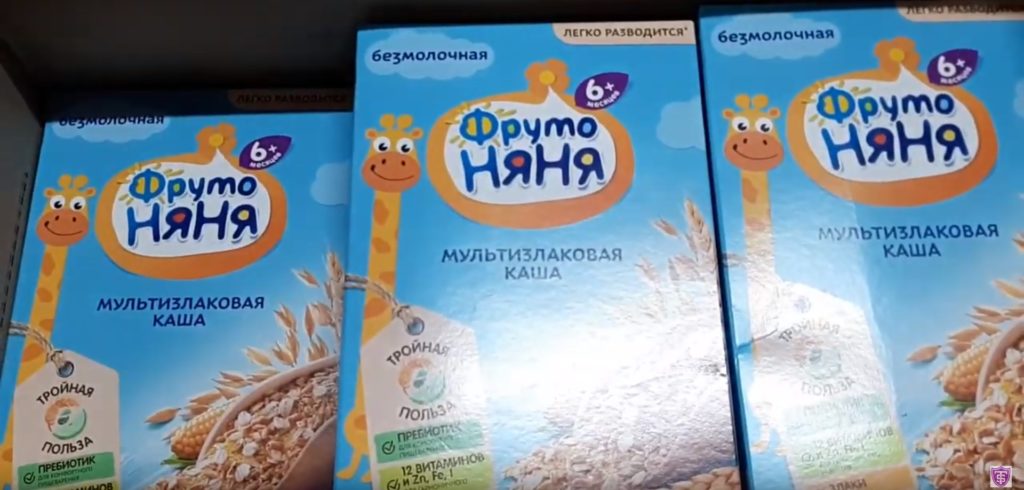
FrutoNanny
Manufacturer - JSC "Progress" is considered the leader in the baby food market in Russia. The functionality of the product manufacturing process involves strict control over its quality and safety. The company produces a complete diet that includes:
- Porridge: dairy and dairy-free (dry and liquid);
- Puree: fruit, vegetable, meat and meat-vegetable;
- Pates;
- Drinks: juices, nectars, fruit drinks and compotes from berries, jelly;
- Soups;
- Dairy products: milk, cocktails, milk with cookies;
- Fermented milk products: biolact, cottage cheese, drinking yoghurts;
- Snacks (fruit pieces and straws, cookies);
- Special products: hypoallergenic, halal, for use before bedtime, organic puree.
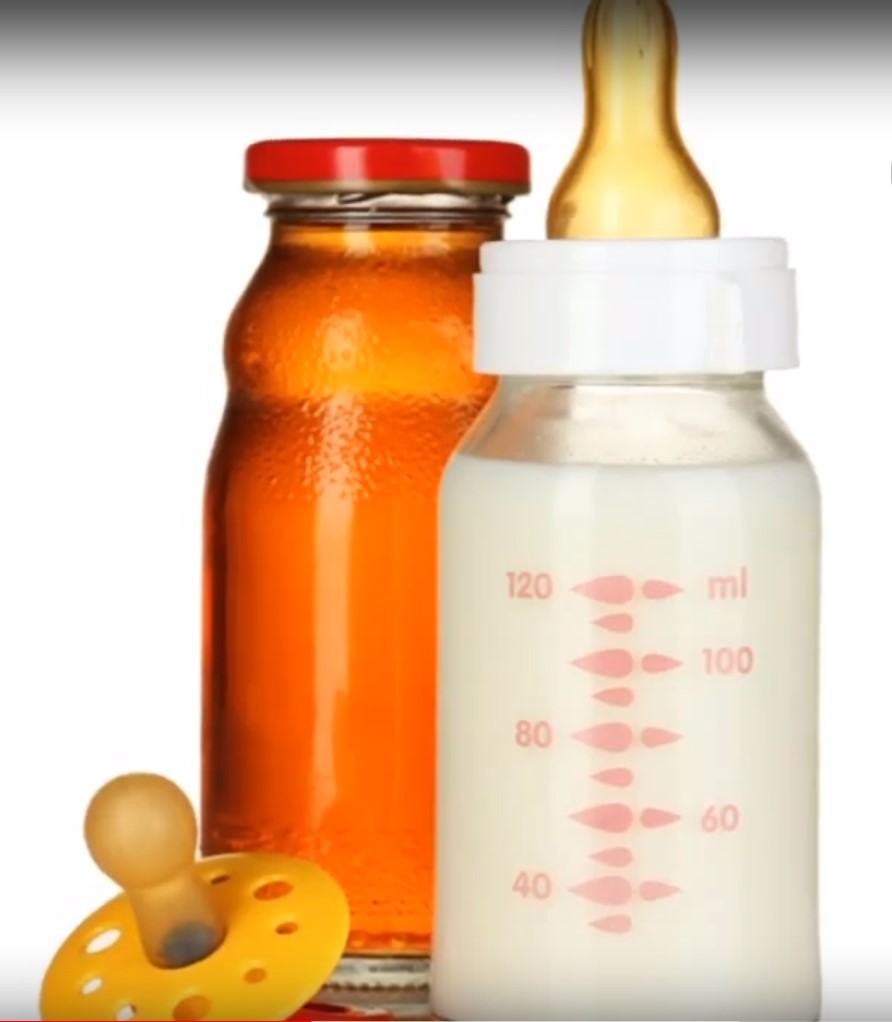
Like many other manufacturers, products are divided into categories depending on the age of the baby:
- "First choice" - intended for children from 4 months;
- "Main menu", which can be used for up to 1 year;
- “Growing up together” - used from 12 months.
The average price for the products of this company is (in rubles):
- Fruit purees in glass jars (100 g) - 39;
- Meat puree (80 g) - 57;
- Porridge (200 g) - 75;
- Snacks (1 pack.of 10 pieces weighing 15 g each) - 40.
Advantages:
- Quality;
- Range.
Disadvantages:
- Price.
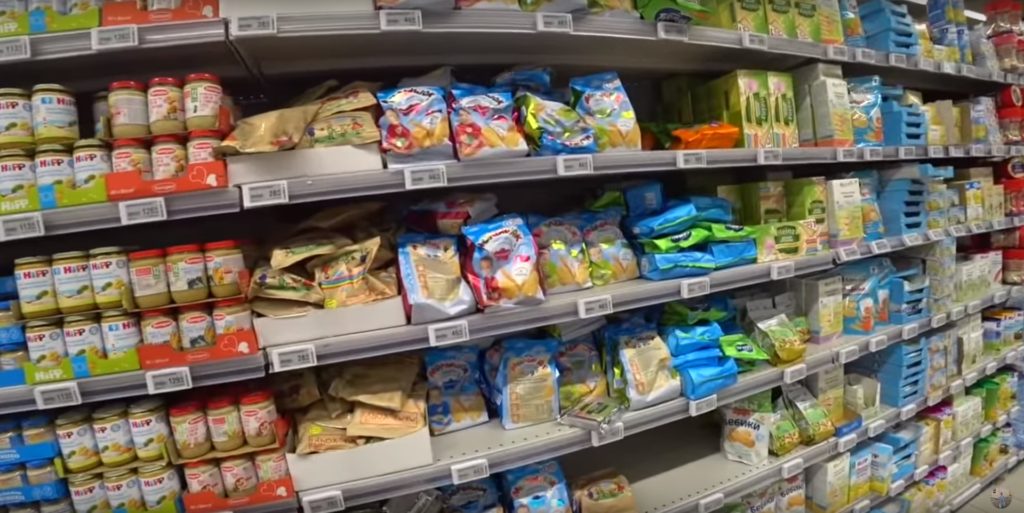
Where to buy baby food?
Today, it is not difficult to purchase products from manufacturers of children's food line. These can be grocery and children's stores, online sellers, pharmacy chains offering both budget options and premium products with an appropriate cost. Many users share tips on where the assortment is better or more reasonable prices. It is important to remember about the need to check the composition, expiration date and confirmation of the quality of the goods.
In conclusion, it should be noted that the correct choice of the manufacturer of baby food is one of the keys to the well-being and mood of the baby. If you can tell us about your experience with the products of any manufacturer of baby food, share it in the comments. Perhaps this will help prevent some of the young parents from making a mistake when choosing a menu for their baby.

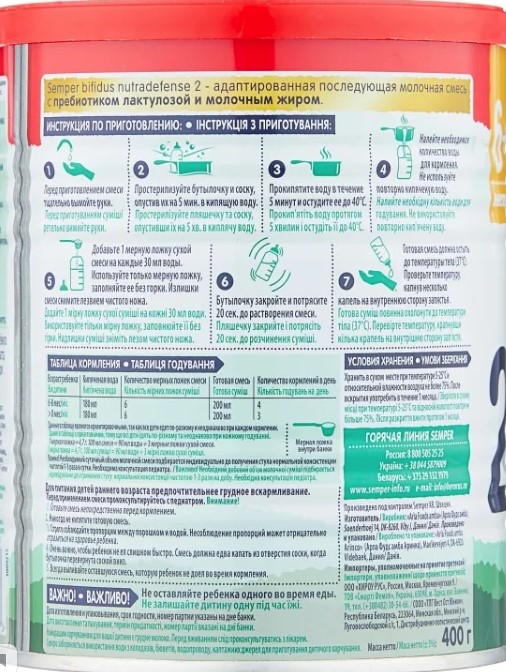












I often give Agusha to my baby. We buy juices and dairy products. The juices are delicious, natural. We buy yoghurts and curds from dairy. For all the time, I have never been allergic to this trademark.